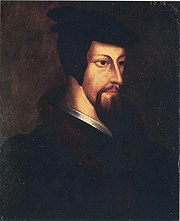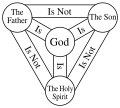The Reformed Christianity Portal
Reformed Christianity, also called Calvinism, is a major branch of Protestantism that began during the 16th-century Protestant Reformation. In the modern day, it is largely represented by the Continental Reformed, Presbyterian, and Congregational traditions, as well as parts of the Anglican (known as "Episcopal" in some regions) and Baptist traditions.
Reformed theology emphasizes the authority of the Bible and the sovereignty of God, as well as covenant theology, a framework for understanding the Bible based on God's covenants with people. Reformed churches have emphasized simplicity in worship. Several forms of ecclesiastical polity are exercised by Reformed churches, including presbyterian, congregational, and some episcopal. Articulated by John Calvin, the Reformed faith holds to a spiritual (pneumatic) presence of Christ in the Lord's Supper.
Emerging in the 16th century, the Reformed tradition developed over several generations, especially in Switzerland, Scotland and the Netherlands. In the 17th century, Jacobus Arminius and the Remonstrants were expelled from the Dutch Reformed Church over disputes regarding predestination and salvation, and from that time Arminians are usually considered to be a distinct tradition from the Reformed. This dispute produced the Canons of Dort, the basis for the "doctrines of grace" also known as the "five points" of Calvinism. (Full article...)
Selected article
Calvin's father was an attorney and in 1523 sent his fourteen-year-old son to the University of Paris to study humanities and law. His Protestant friends included Nicholas Cop, Rector at the University of Paris. In 1533 Cop gave an address "replete with Protestant ideas," and "Calvin was probably involved as the writer of that address." Calvin later settled for a time in Basel, where in 1536 he published the first edition of his Institutes. John Calvin died in Geneva on May 27, 1564. He was buried in the Cimetière des Rois under a tombstone marked simply with the initials "J.C.", partially honoring his request that he be buried in an unknown place, without witnesses or ceremony.
Selected images
Did you know...
- ...that the First Presbyterian Church in Jamaica, Queens, is the oldest continuously serving Presbyterian church in the United States?
- ...that as he lay dying, the American Presbyterian theologian J. Gresham Machen declared that there is no hope without the active obedience of Christ?
- ... that Scottish religion in the seventeenth century included intense conflicts between Presbyterian Covenanters and government forces?
Subcategories
Topics
Background: Christianity • St. Augustine • The Reformation • John Calvin • Five Solas • Synod of Dort
Theology: Five Points (TULIP) • Covenant Theology • Regulative principle
Documents: Calvin's Institutes • Confessions of faith • Geneva Bible
Influences: Theodore Beza • John Knox • Jonathan Edwards • Princeton theologians • Henry Cooke
Churches: Reformed • Presbyterian • Congregationalist • Reformed Baptist
Peoples: Afrikaner Calvinists • Huguenots • Pilgrims • Puritans • Scots • Ulster Protestants
WikiProjects
Things to do
 |
Here are some tasks awaiting attention:
|
If those don't satisfy, try wandering through Category:Reformed Christianity articles by quality looking for things to do.
Related portals
Associated Wikimedia
The following Wikimedia Foundation sister projects provide more on this subject:
-
Commons
Free media repository -
Wikibooks
Free textbooks and manuals -
Wikidata
Free knowledge base -
Wikinews
Free-content news -
Wikiquote
Collection of quotations -
Wikisource
Free-content library -
Wikiversity
Free learning tools -
Wiktionary
Dictionary and thesaurus


























